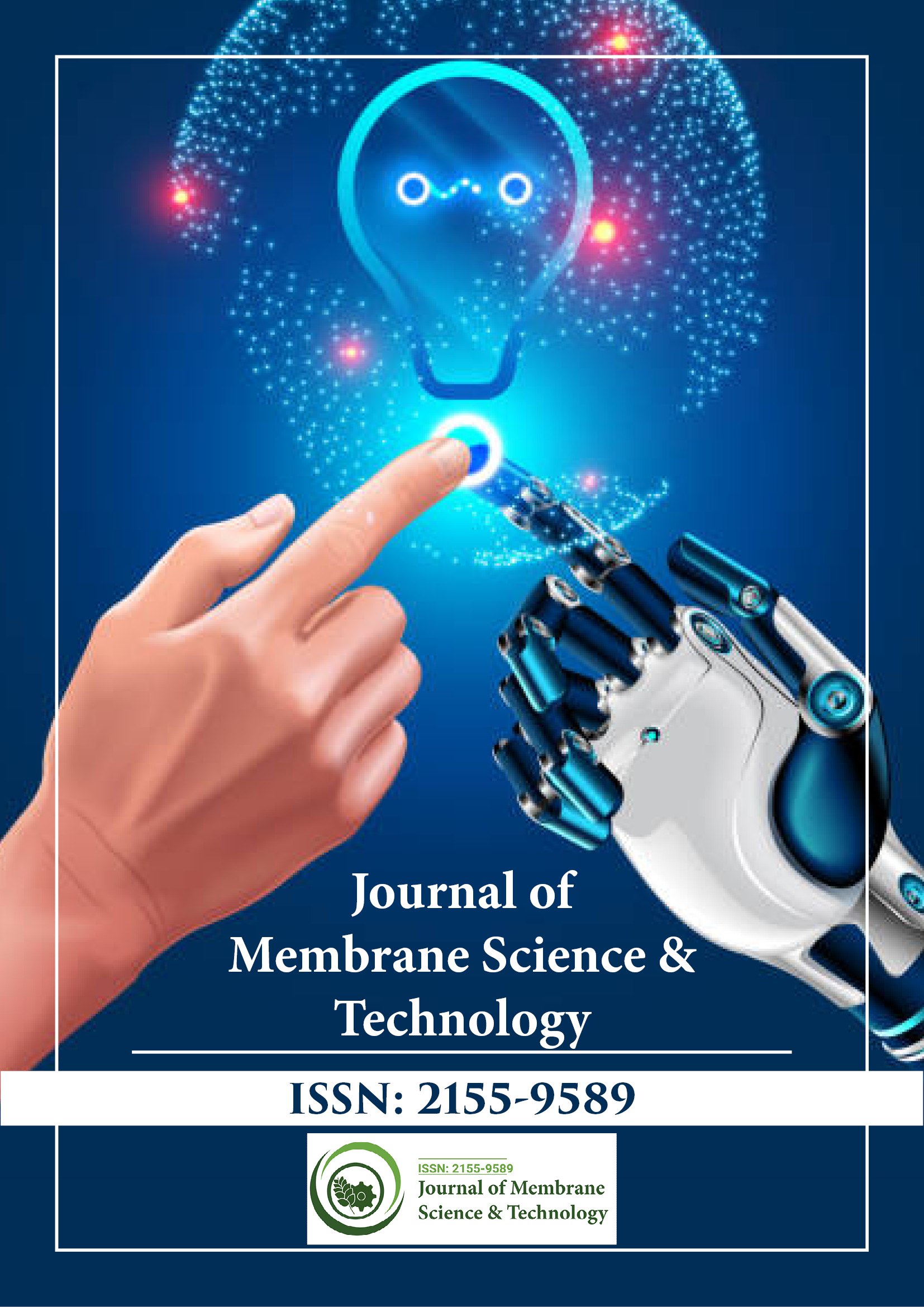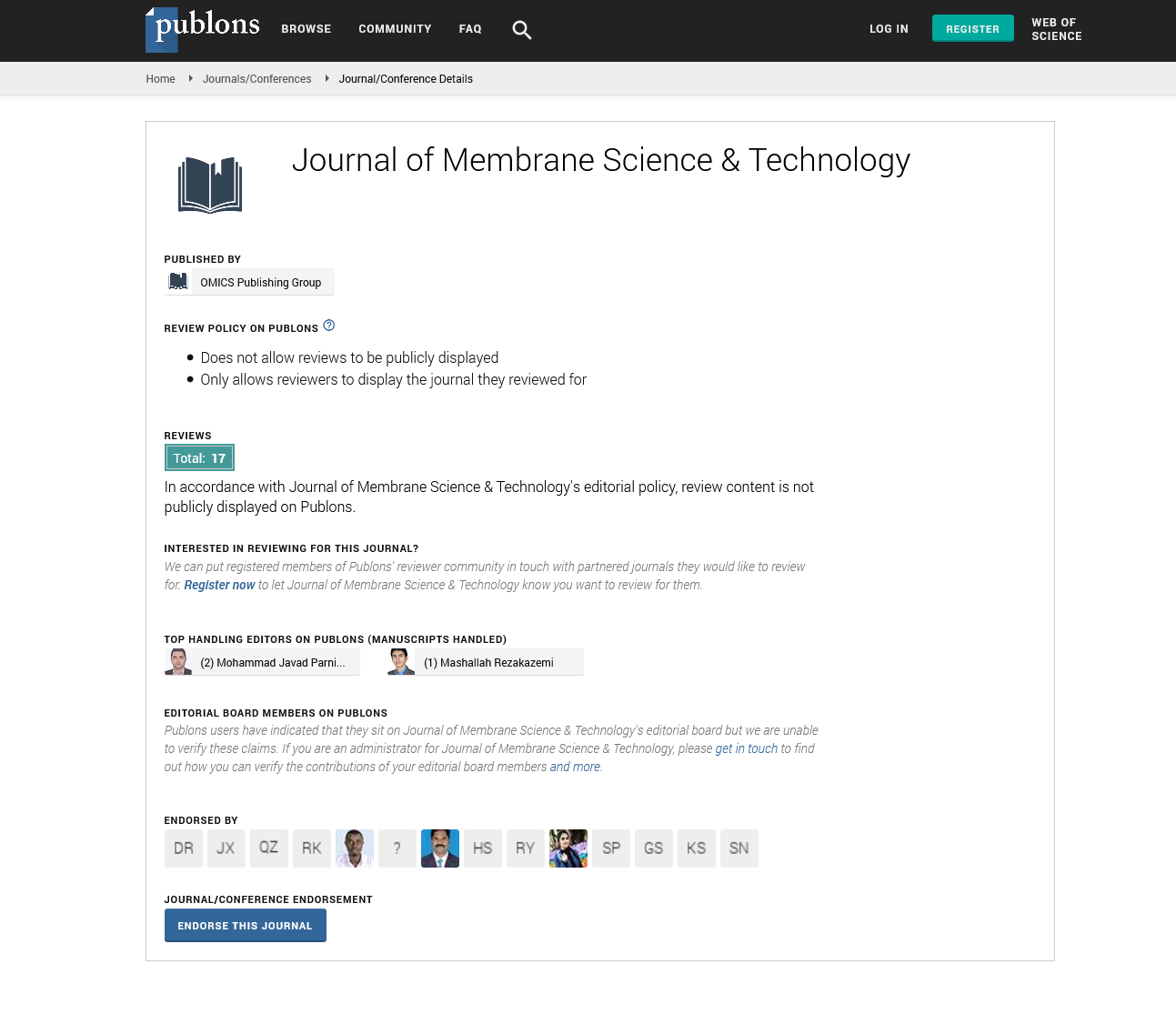Indexed In
- Open J Gate
- Genamics JournalSeek
- Ulrich's Periodicals Directory
- RefSeek
- Directory of Research Journal Indexing (DRJI)
- Hamdard University
- EBSCO A-Z
- OCLC- WorldCat
- Proquest Summons
- Scholarsteer
- Publons
- Geneva Foundation for Medical Education and Research
- Euro Pub
- Google Scholar
Useful Links
Share This Page
Journal Flyer

Open Access Journals
- Agri and Aquaculture
- Biochemistry
- Bioinformatics & Systems Biology
- Business & Management
- Chemistry
- Clinical Sciences
- Engineering
- Food & Nutrition
- General Science
- Genetics & Molecular Biology
- Immunology & Microbiology
- Medical Sciences
- Neuroscience & Psychology
- Nursing & Health Care
- Pharmaceutical Sciences
Articles published in Journal of Membrane Science & Technology have been cited by esteemed scholars and scientists all around the world. Journal of Membrane Science & Technology has got h-index 13, which means every article in Journal of Membrane Science & Technology has got 13 average citations.
Following are the list of articles that have cited the articles published in Journal of Membrane Science & Technology.
| 2024 | 2023 | 2022 | 2021 | 2020 | 2019 | 2018 | 2017 | 2016 | 2015 | 2014 | 2013 | 2012 | 2011 | |
|---|---|---|---|---|---|---|---|---|---|---|---|---|---|---|
Total published articles |
35 | 56 | 60 | 55 | 10 | 7 | 17 | 9 | 27 | 12 | 5 | 16 | 17 | 13 |
Research, Review articles and Editorials |
4 | 0 | 4 | 5 | 4 | 6 | 14 | 2 | 25 | 4 | 3 | 7 | 7 | 10 |
Research communications, Review communications, Editorial communications, Case reports and Commentary |
23 | 60 | 56 | 50 | 6 | 1 | 3 | 7 | 2 | 8 | 2 | 9 | 10 | 3 |
Conference proceedings |
0 | 0 | 0 | 0 | 0 | 0 | 34 | 44 | 0 | 0 | 0 | 0 | 0 | 0 |
Citations received as per Google Scholar, other indexing platforms and portals |
118 | 149 | 167 | 156 | 154 | 98 | 54 | 38 | 32 | 26 | 18 | 11 | 7 | 0 |
| Journal total citations count | 972 |
| Journal impact factor | 1.92 |
| Journal 5 years impact factor | 2.24 |
| Journal cite score | 5.4 |
| Journal h-index | 13 |
Important citations
Samaei, S. M., Gato-Trinidad, S., & Altaee, A. (2018). The application of pressure-driven ceramic membrane technology for the treatment of industrial wastewaters–A review. Separation and Purification Technology, 200, 198-220.
Singh, G., & Patidar, S. K. (2018). Microalgae harvesting techniques: A review. Journal of environmental management, 217, 499-508.
ŠAKI?, D. KVANTNO-KEMIJSKO ISTRAŽIVANJE REAKCIJA PREGRAÐIVANJA ODABRANIH PSIHOFARMAKA.
Šaki?, D. (2015). Kvantno-kemijsko istraživanje reakcija pregra?ivanja odabranih psihofarmaka (Doctoral dissertation, University of Zagreb. Faculty of Pharmacy and Biochemistry.).
Samhari, O. (2021). Membranes céramiques et polymères modifiées par de l’oxyde de graphène pour la rétention de molécules organiques et le dessalement d’eaux saumâtres et d’eau de mer (Doctoral dissertation, Université Rennes 1; Université Hassan II (Casablanca, Maroc)).
Le Petit, L., Rabiller-Baudry, M., Touin, R., Chataignier, R., Thomas, P., Connan, O., & Périon, R. (2021). Efficient and rapid multiscale approach of polymer membrane degradation and stability: Application to formulation of harmless non-oxidative biocide for polyamide and PES/PVP membranes. Separation and Purification Technology, 259, 118054.
Hashiba, K., Nakai, S., Nishijima, W., Ohno, M., & Gotoh, T. (2020). Degradation of secondary polyamide reverse osmosis membrane by hypochlorite in the presence of calcium ions. Polymer Degradation and Stability, 181, 109351.
Haflich, H. M., Membreno, M. A. R., Jo, H., Huang, K., Toomey, M., Howarter, J. A., & Shah, A. D. (2021). Effect of halides on polyamide-based membrane flux and monomer degradation during chloramination. Journal of Membrane Science, 639, 119717.
Do, T. V. Effects of chlorine exposure on physiochemical properties and performance of polyamide membranes.
Prehn Jr, F. C. (2016). Use of chain growth polycondensation via substituent effects for the development of new polymer brush systems. Colorado School of Mines.
Verbeke, R., Bergmaier, A., Eschbaumer, S., Gomez, V., Dollinger, G., & Vankelecom, I. (2019). Elemental depth profiling of chlorinated polyamide-based thin-film composite membranes with elastic recoil detection. Environmental science & technology, 53(15), 8640-8648.
Maugin, T. (2013). Fate of reverse osmosis (RO) membranes during oxidation by disinfectants used in water treatment: impact on membrane structure and performances (Doctoral dissertation).
Hashiba, K., Nakai, S., Ohno, M., Nishijima, W., Gotoh, T., & Iizawa, T. (2019). Deterioration mechanism of a tertiary polyamide reverse osmosis membrane by hypochlorite. Environmental science & technology, 53(15), 9109-9117.
Huang, K., Reber, K. P., Toomey, M. D., Haflich, H., Howarter, J. A., & Shah, A. D. (2019). Reactivity of the polyamide membrane monomer with free chlorine: reaction kinetics, mechanisms, and the role of chloride. Environmental science & technology, 53(14), 8167-8176.
Mohtasebi, A., Broomfield, A. D., Chowdhury, T., Selvaganapathy, P. R., & Kruse, P. (2017). Reagent-free quantification of aqueous free chlorine via electrical readout of colorimetrically functionalized pencil lines. ACS applied materials & interfaces, 9(24), 20748-20761.
Stolov, M., & Freger, V. (2019). Degradation of polyamide membranes exposed to chlorine: an impedance spectroscopy study. Environmental science & technology, 53(5), 2618-2625.
Montes-Rojas, A., Ramírez-Orizaga, M., Ávila-Rodríguez, J. G., & Torres-Rodríguez, L. M. (2020). Study of Polyaniline/Poly (Sodium 4-Styrenesulfonate) Composite Deposits Using an Electrochemical Quartz Crystal Microbalance for the Modification of a Commercial Anion Exchange Membrane. Membranes, 10(12), 387.
Xu, L., Shan, B., Gao, C., & Xu, J. (2020). Multifunctional thin-film nanocomposite membranes comprising covalent organic nanosheets with high crystallinity for efficient reverse osmosis desalination. Journal of Membrane Science, 593, 117398.
Ahmad Tarmizi, A. A., & Azmi, M. A. (2020). Ion exchange behavior of polyaniline and polyaniline/silica composite. Scientific Research Journal, 17(1), 59-72.
Gohil, J. M., & Suresh, A. K. (2017). Chlorine attack on reverse osmosis membranes: Mechanisms and mitigation strategies. Journal of Membrane Science, 541, 108-126.

